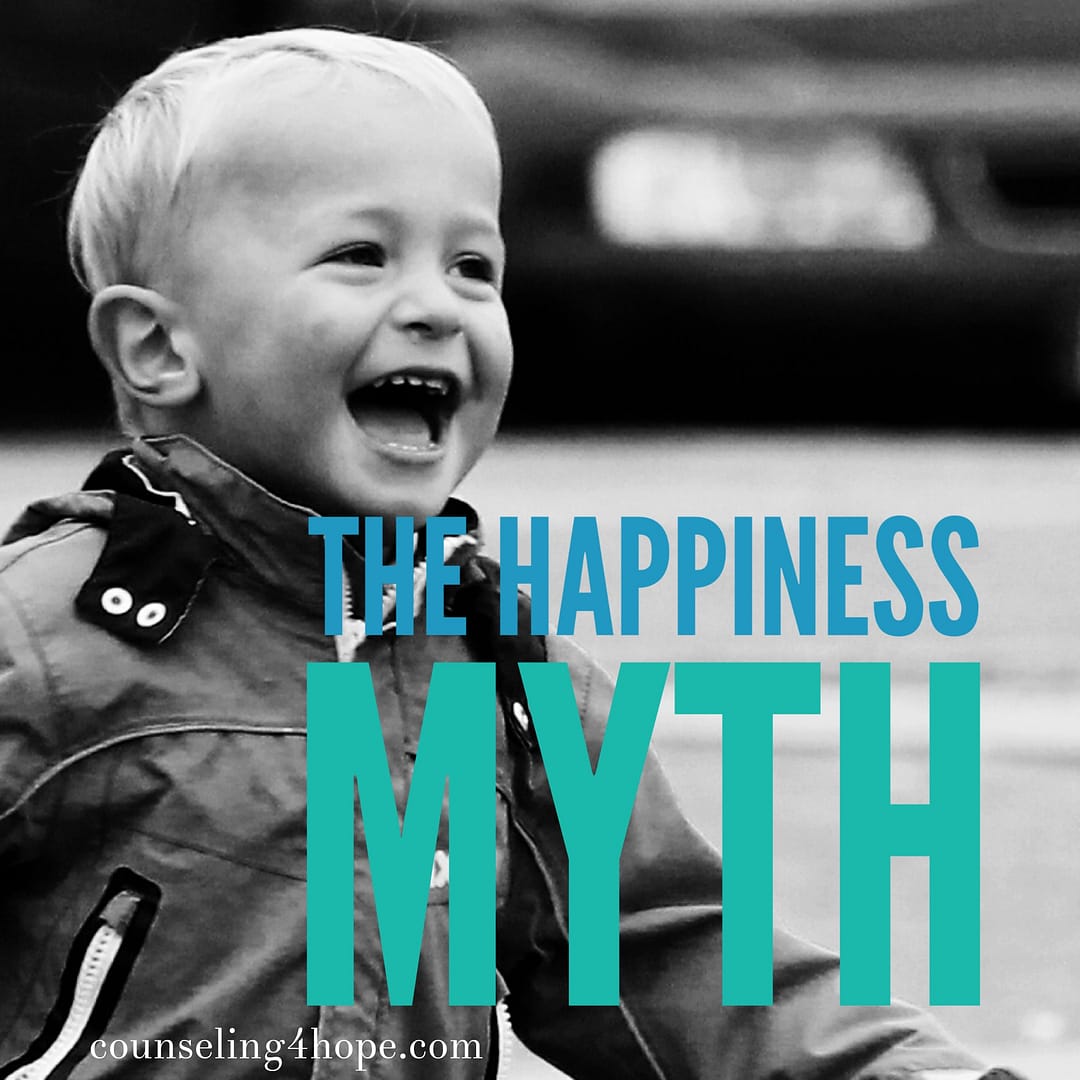Are you happy? How much time do you spend thinking about happiness? Everyone seems to be chasing it. The pursuit of happiness is ingrained in Americans. Do you think happiness is an achievable, permanent state? I think a lot of us do. Most clients mention happiness as one of their goals for counseling. I hear a lot of people say things like “I’m just not happy”; “I just want to be happy”; “Life shouldn’t be so hard”.
As I listen to people speak about happiness, I’ve observed a common definition of happiness. Most view happiness as the fulfillment of personal desires and pleasure and/or the absence of struggle, conflict, or pain.
Unfortunately, this definition of happiness describes a fleeting, temporary experience not a permanent state. This collides head on with our expectation that happiness be permanent. We freak out thinking something is wrong with us because we aren’t happy. If our expectation of life is perpetual happiness, we will find ourselves continually frustrated. Because life is full of difficult circumstances, painful emotions, and challenging people.
There’s a great concept in psychology called radical acceptance. I’ve thought about this idea a lot this week. Basically radical acceptance is accepting all of what is instead of resisting reality. You may not think you resist reality but you probably do. Radical acceptance involves accepting your circumstances, your emotions, your past, and your pain.
You see, we add to our pain by resisting. We resist reality, we resist emotions, and we resist our circumstances. One way we resist is by dwelling on how awful something is and wishing it were different (or desperately praying for God to intervene and change it). Take a moment and think about what situation or emotion you are resisting? How are you resisting? Radical acceptance involves accepting reality for what it is even if it isn’t what we want it to be.
Acceptance isn’t approval. Much of life falls outside our control: we may lose a job, a close family member dies, a marriage ends, a traumatic event happens, or we may become ill. All of these situations are not things we would choose or approve of. However, we can radically accept that they are a real part of our life. Failing to do this actually increases our suffering and delays healing, growth, and problem solving.
Acceptance is also not surrender. We accept what is in our past and in our present moment. Change comes by what we do next…in the future. Accepting reality allows us to let go of what we have no control over and look at the power we do have. It is a shift towards resilience which is the ability to recover from difficulties. Resilience first begins with accepting that the difficulty exists.
This is not easy. Radical acceptance is a deeply internal and difficult experience because our nature fights against this idea.
Radical acceptance involves accepting:
- reality for what it is
- that everything has a cause
- that life can be worth living even during painful circumstances.
Now I think radical acceptance is a part of faith for the Jesus follower. The Bible teaches that God is sovereign and that suffering is a part of life. Jesus radically accepted that he must go to the cross even though he experienced suffering and betrayal. Paul radically accepted tremendous hardship for the sake of spreading the gospel. Nowhere in scripture is happiness taught. What is taught is contentment in all circumstances (Philippians 4:11-13).
So here’s what blew my mind this week….contentment requires radical acceptance. Contentment is a deeper satisfaction despite circumstances. This is sustainable. Unlike happiness, contentment is rooted in acceptance: acceptance of reality as it is and the acceptance of God’s unchanging truth.
These two ideas increase the power of radical acceptance
- I can radically accept reality. We live in a broken world with broken people.Whatever is going on in your life that is outside of your control, accept it. That difficult person, accept them for who they are. You may wish they would change but you have no power to change them.That challenge you are facing (loss of job, physical disability, loss of a relationship, unfair treatment, large amount of work for school, the political chaos right now etc), accept it. It is what is.
Wishing circumstances were different doesn’t change reality and doesn’t empower you for the next moment. Accept it. Change, growth, and hope begin with acceptance.
I can radically accept that I live in a broken world and will have trouble. I can radically accept that God has overcome (John 16:33).
What are you resisting accepting?
How has this resistance increased your suffering?
How might acceptance empower you for what’s next?
Struggling or want to learn more about radical acceptance? Follow my social media this week for additional articles and information. Need help, reach out and contact a good counselor.


